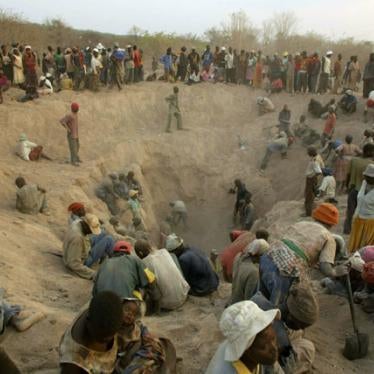Namibia hosts the Kimberley Process Intersessional Meeting in Windhoek starting tomorrow. Namibia's Deputy Mines Minister, Bernhard Esau, who chairs the Kimberley Process Certification Scheme (KPCS), has a problem on his hands: protecting the integrity and credibility of the Process and the international diamond industry.
Human Rights Watch will release a report this week containing overwhelming evidence that Zimbabwe is undermining the Kimberley Process, in which it is a formal participant. Zimbabwe's Marange diamond fields, near the Mozambican border, were discovered in 2006. Zimbabwe police and then elite units of the Zimbabwe defence forces assumed control of these fields in November 2006 and October 2008, respectively. Using extreme violence and intimidation, the military killed more than 200 local miners in just three weeks in late 2008 and has perpetrated numerous other abuses including forced labour, torture, and arbitrary arrest. The violations continue today.
The sheer brutality and scale of the violence in Marange justify the treatment of Marange stones as, or equivalent to, "conflict diamonds". Up to now, the term has referred exclusively to diamonds mined in areas controlled by rebel armies. But it is not credible for the Kimberley Process to keep saying that abuses committed by rebel armies are qualitatively or quantitatively different from the same kind of abuses committed by states or their security forces. Just ask the victims.
Diamond consumers will also see no distinction when they hear about the Zimbabwean army using children as forced labour in Marange. Or read the words of a man who saw soldiers shoot and kill his nephew and six others near the diamond fields. Or learn about the man who was forced, together with others, to dig a mass grave for 72 dead local miners whom soldiers had shot and killed in Marange in October 2008.
Why is all this happening? Human Rights Watch's research suggests that senior members of Zimbabwe's ZANU-PF and their military allies benefit extensively from the significant revenues generated by Marange's diamonds. They are using fear and violence to protect their interests, outside the framework of the country's power-sharing government. The revenue from Marange, believed to be the world's largest concentration of diamonds, should be helping Zimbabwe recover from years of ZANU-PF economic mismanagement. But ordinary Zimbabweans - including local people in Marange - do not benefit. Under transparent commercial management, Marange diamonds could generate US$200m per month in revenue for essential services like health delivery and education.
The Kimberley Process can play an important role both in ending abuses connected to illicit extraction and smuggling and in helping Zimbabwe emerge from its economic crisis. This may in turn attract development aid from the international community. Some diamond sellers have tried to reassure their customers by saying that they will not trade or buy Marange stones. But so far the KPCS has only taken modest steps. It issued a statement expressing "growing concerns" at what was happening in Marange. It sent a high-level envoy to Zimbabwe and published a "footprint" (to help traders and consumers identify diamonds from Marange). However, the smuggling and serious human rights abuses go on.
It is time for stronger measures. First, the KPCS should restate in the clearest possible terms its concern about the situation in Zimbabwe and its determination to act. Second, it should demand that its investigation team going to Zimbabwe next week has full and unfettered access to the Marange diamond fields, consults local residents and civil society, and issues a quick, credible report. Third, the KPCS must then act firmly: trade in Marange diamonds must be banned until Zimbabwe demonstrates that human rights abuses there and official links to corruption, smuggling and mismanagement have stopped for good.
The Kimberley Process has proved its worth in the past. It still claims to champion trade in clean, conflict-free diamonds. But its future success depends on honouring its core values and showing zero tolerance for serious human rights abuses and smuggling, and ensuring complete transparency and accountability in diamond mining. Diamonds are vital to southern Africa's economy. Reputations take years to build and only weeks to destroy. It would be tragic for the region, its corporations, and its thousands of mineworkers if international consumers shunned its diamonds because of inaction on human rights abuses in Zimbabwe. It would be equally tragic if the credibility of the Kimberley Process were left in tatters on Namibia's watch.
Jon Elliott is Human Rights Watch's Africa Advocacy Director







